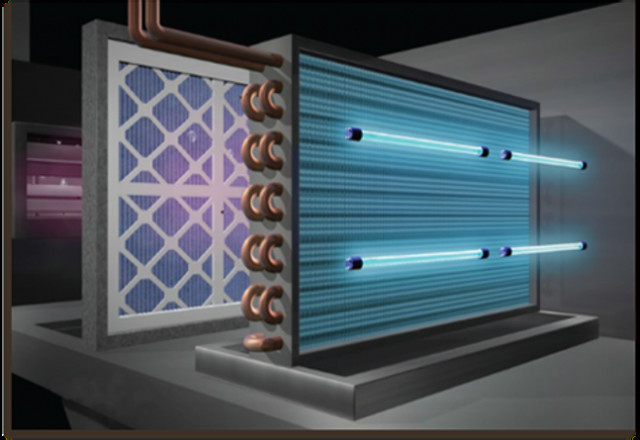The importance of good HVAC hygiene

In order for the UK to get back to work, school and spending money, people need to be confident that the buildings they’re entering are as safe as they can be. With more evidence emerging that COVID-19 spreads in the air, we must ensure airborne pathogens are removed from our indoor environments.
We’ve washed our hands and we’ve kept our distance – at the moment, it looks like the Coronavirus pandemic is on the retreat or at least under control in the UK. Complete paralysis of the economy cannot continue and now confidence in a return to normal(ish) life must be instilled. With a growing understanding of the part airborne transmission has to play in the spread of COVID 19, it’s clear that the systems involved in drawing in and distributing air around our indoor spaces need to work properly and be suitably disinfected.
Scientific evidence
The British Medical Journal recently reported that microscopic respiratory droplets containing COVID 19 can hover in the air for minutes or even hours, potentially drifting many metres horizontally. Other scientific communities around the world are making similar findings – 239 scientists recently wrote to the World Health Organisation (WHO) raising their concerns about the issue.
How dangerous are our HVAC systems?
A report from the European Centre for Disease Prevention and Control concluded that while heating, ventilation and air-conditioning systems (HVACs) filter out large droplets containing the coronavirus, the airflow could blow the droplets over a larger distance than they would travel in a still setting. The report also states such systems could spread COVID 19 aerosols if air is recirculated.
Despite the potential for spread via HVAC, there is currently no evidence of a human COVID 19 infection caused by contaminated aerosols distributed via ventilation ductwork. We are still learning all the time when it comes to coronavirus so caution is best, particularly as in this instance practices that may halt the spread of infection, offer a host of other benefits to building owners and occupants.
Even before coronavirus, our understanding of indoor air quality (IAQ) and its effect on occupants’ health and wellbeing was growing. Removing airborne debris, including particulate matter, bacteria and viruses, contributes to healthier people, less likely to succumb to a range of diseases. On a less dramatic note, good IAQ leads to improved mood and productivity.
From the outside in
Preventing airborne contaminants from entering a building begins on the outside, with pre-filtration media fixed to air intakes blocking larger pollutants. Primarily used to improve HVAC efficiency, pre-filtration can also be viewed as the first step in ensuring good IAQ.
By helping AHUs to work at their optimum, reliant air conditioning and ventilation systems will do their job properly. Stopping debris clogging a system is just one part of this process - HVAC plant must be maintained, refurbished or upgraded where required.
A word about refurbishment. An AHU upgrade is an extremely costly and disruptive process, particularly for buildings in cramped city centres where access can be an issue. Refurbishment has a lot to recommend it; the replacement of key parts, such as fans, for example, can have a significant impact on operational efficiency and running costs.
Improve air quality, save money
Apart from the health & safety aspect, most businesses have suffered a knock as a result of lockdown - spiralling energy bills, expensive repairs, breakdown and subsequent downtime are something to be avoided.

When it comes to reducing overheads, buildings that have opted for ECEX Air Intake Screens benefit from the extension of filter life – by up to 60% - and a reduction in maintenance requirements up to 75%. Coil treatment and cleaning costs can also be reduced. Add improved energy efficiency to this mix and pre-filtration offers attractive savings that any organisation watching its purse strings should be interested in.
Cleaning the air
Once in the room, there are purification solutions that clean out pathogens, helping to ensure that circulating air is safe to breathe.
Before this point, as air is cooled passing across the coil, condensation can build up, creating the ideal conditions for airborne nasties to accumulate in a biofilm, reducing the efficiency of the coil and potentially leading to an influx of harmful air.
Disinfection of airflow using chemical-free ultra-violet (UV) airflow cleaning systems will prevent bacteria, viruses and organic growth from taking-hold on cooling coils. Originally intended to contribute HVAC component efficiency, these types of solutions have a new purpose in the fight against coronavirus.
In fact, in the letter sent to the WHO by the scientific community, improvements to indoor ventilation, as well as the use of airborne infection controls, such as filters and UV lights, were listed as potential safeguards against aerosol transmission.
Regardless of coronavirus, by reducing organic growth throughout the entire HVAC system, IAQ is improved, contributing to the all-important occupational health benefits that are so important in people-filled spaces.
John Grenville is MD of ECEX.







